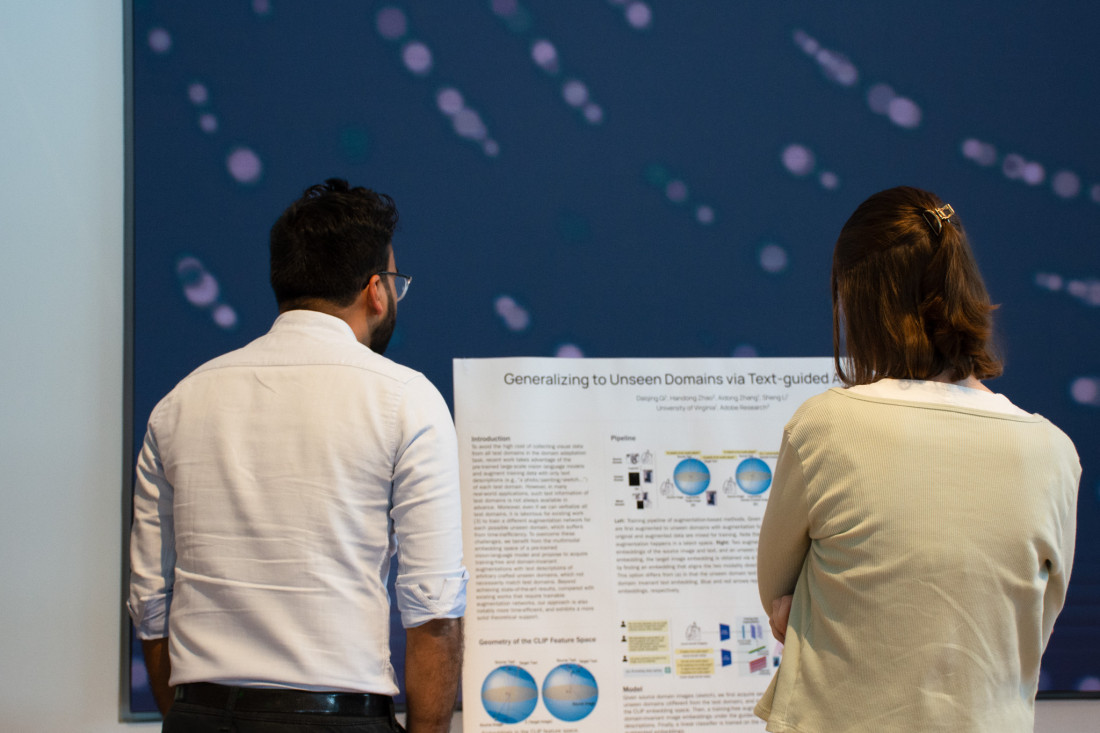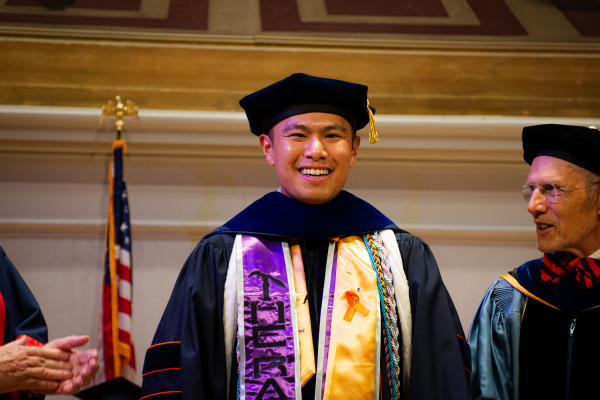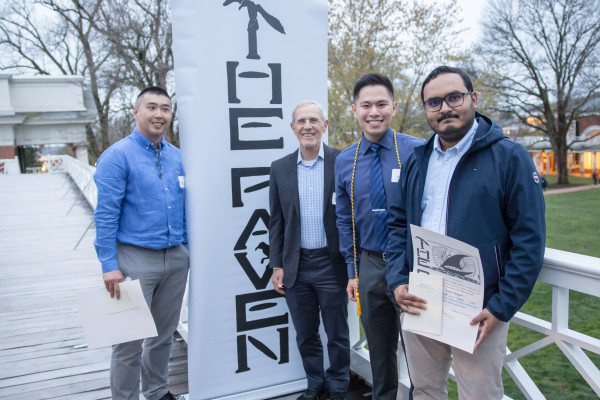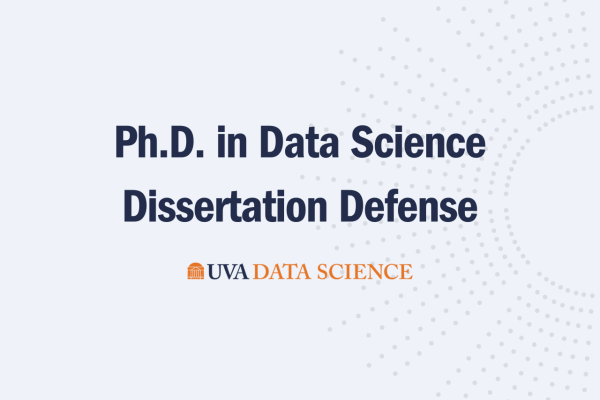
UVA Doctoral Students Showcase Potential of Advanced Data Science Research

Doctoral students from the University of Virginia’s School of Data Science kicked off the new academic year with a research showcase, highlighting the broad range of areas that advanced studies in data science can help illuminate.
The event also served as a celebration of the doctoral program and what it means to the mission of the School of Data Science.
"The Ph.D. program is kind of the perfect mixing of our research endeavors and our educational endeavors," said Thomas Stewart, an associate professor of data science and Ph.D. program director, in opening remarks.

Don Brown, senior associate dean for research and the Quantitative Foundation Distinguished Professor in Data Science, noted that the event was "arguably the best part of the summer," as faculty, staff, and students are given the opportunity to see first-hand the high-level research that Ph.D. students at the School of Data Science had been pursuing in recent months.
Brown also urged audience members as they listened to the oral presentations from second-year students and viewed the research posters from third-year students to ask challenging questions, saying that was "the biggest gift you can give the person" who was presenting.
Oral presentations were delivered by 13 second-year Ph.D. students, whose research covered everything from health care chatbots to deep dives into a wide range of methodological techniques, as well as issues pertaining to large language models.
Later, 13 third-year students presented research posters that addressed critical issues such as health care, K-12 education, the environment, and many others.
Following the presentations, an awards ceremony was held, one that both recognized the research that had just been discussed and that celebrated the achievements of the School of Data Science doctoral program — its students, faculty, and staff — over the previous year. Stewart also highlighted a sampling of recent research publications from the School's doctoral students.
As the day wound down, Jeffrey Blume, Quantitative Foundation Associate Dean for Academic and Faculty Affairs in Data Science, urged the newest group of School of Data Science Ph.D. students in attendance to take inspiration from what they had just seen.
"For those students who are new and who are here, you get a sense of what people are doing their first couple of years, so it's something to look forward to. We look forward to seeing your names up here on publications and listening to your work," he said.
The 2024-25 academic year will mark the third full year of UVA’s data science doctoral program, which launched in fall 2022. And, for the first time, students in all academic programs will be able to take classes and collaborate with faculty and classmates at the new home of the School of Data Science, which held its grand opening in April.
Awards
Best Oral Presentations
- Ethan Nelson, who discussed his work that examined whether signal neural networks can evolve to capture how signals travel between neurons over time
- Ahson Saiyed, who presented his enhanced benchmark, called TAXI 2.0, for evaluating the capacity of knowledge editing methods to leverage batched property edits to make consistent categorical knowledge edits in large language models
Best Research Poster
- Karolina Naranjo-Velasco, who presented her work on facilitating data-drive approaches to legal text analysis of documents from the Colombian Constitutional Court
- Jason Wang, who presented his work assessing computer vision-based worker poster analysis methods
Leadership and Service Award
- Beau LeBlond, a third-year Ph.D. student
Outstanding Teaching Award
- Jonathan Kropko, a Quantitative Foundation Associate Professor of Data Science
Outstanding Mentoring Award
- Stephen Baek, a Quantitative Foundation Associate Professor of Data Science
Outstanding Student Support Award
- Kylen Baskerville, program manager for the School of Data Science
Full list of second-year oral presentations
- Jack Beerman: PARCv2: Physics-aware Recurrent Convolutional Neural Networks for Energetic Material Generalization
- Supervising faculty: Stephen Baek
- Zoë Gray: Implementing PARCv2 at Lawrence Livermore National Lab: From Installation to Prediction
- Supervising faculty: Stephen Baek
- Dongliang Guo: BalancEdit: Dynamically Balancing the Generality-Locality Trade-off in Multi-modal Model Editing
- Supervising faculty: Don Brown
- Mengxuan Hu: Be Careful! Rag Compromises LLMs’ Fairness, Even When Users Do Not Intend To!
- Supervising faculty: Stephen Baek
- Justin Lee: Extending Simulation-Free Score and Flow Matching via Splines in Wasserstein Space
- Supervising faculty: Heman Shakeri
- Elizabeth Miller: Adaptations to R2 for Prediction Assessment
- Supervising faculty: Jeffrey Blume
- Ethan Nelson: Digital Organoid: A Network Graph Model for Neural Signaling
- Supervising faculty: John Darrell Van Horn
- Eric Onyame: Unsupervised Zero-Shot Domain Adaptation in Heterogeneous Graphs with Co-Attention and Gromov-Wasserstein Alignment
- Supervising faculty: Sheng Li
- Jiaxing Qiu: Predictive Standard Regression for Clustered Data: Fast Leave-Once-Cluster-Out Cross-Validation Using Clustered Network Information Criterion
- Supervising faculty: Teague Henry
- Ahson Saiyed: If It Walks Like a Duck: Editing Concepts by Editing Facts
- Supervising faculty: Tom Hartvigsen
- Guangya Wan: Evaluating LLM-based Health Care Chatbots: An Interdisciplinary Exploration of Long-Context Understanding and Guideline Adherence in Differential Diagnosis
- Supervising faculty: Sheng Li and Tom Hartvigsen
- Mia Yuan: Knowledge Graphs: A Comprehensive Survey of Applications, Construction Methodologies, and Interdisciplinary Usage
- Supervising faculty: Alex Gates
- Miles Zhou: Chatting with Bias: An Agent-Based Framework to Evaluate Conversational Outcomes in Language Models
- Supervising faculty: Tom Hartvigsen
Full list of third-year poster presentations
- Navya Annapareddy: End-to-end 3D Reconstruction of Infant General Movements from Monocular Video
- Supervising faculty: Stephen Baek
- Zhanwen Chen: Video Understanding through Video-to-Text Representation Learning
- Bryan Christ: MATHWELL: Generating Educational Math Word Problems
- Supervising faculty: Tom Hartvigsen
- Zachary Jacokes: Unsupervised Dimensionality Reduction Techniques for the Assessment of ASD Biomarkers
- Supervising faculty: John Darrell Van Horn
- Beau LeBlond: Quantifying Connections between Science and Government
- Supervising faculty: Alex Gates
- Luz Melo: Applications of Linear Mixed-Effects Models in Longitudinal Health Studies
- Supervising faculty: Thomas Stewart
- Karolina Naranjo-Velasco: An Enhanced Dataset of Colombian Constitutional Court Decisions Using Visual Cues
- Supervising faculty: Jonathan Kropko
- Jade Preston: Hyperspectral Pixel Unmixing with Large Spectral Libraries on Soils and Minerals
- Supervising faculty: William Basener
- Daiqing Qi: Generalizing Vision-Language Models to Unseen Domains via Text-guided Augmentation
- Supervising faculty: Sheng Li
- Weili Shi: Leveraging Large Language Models for Dynamic Text-Attributed Graphs Learning
- Supervising faculty: Sheng Li
- Gia Smith: Survey Research on Lung Cancer Screening: Biomarker Disparities
- Supervising faculty: Jess Reia and Jeffrey Blume
- Jason Wang: Assessment of Computer-Vision-Based Worker Posture Analysis Methods
- Supervising faculty: Stephen Baek
- Meesun Yang: Analysis of Vegetation Chemistry Using Feature Selection and Machine Learning Methods on Hyperspectral Images
- Supervising faculty: William Basener
- Supervising faculty: William Basener


